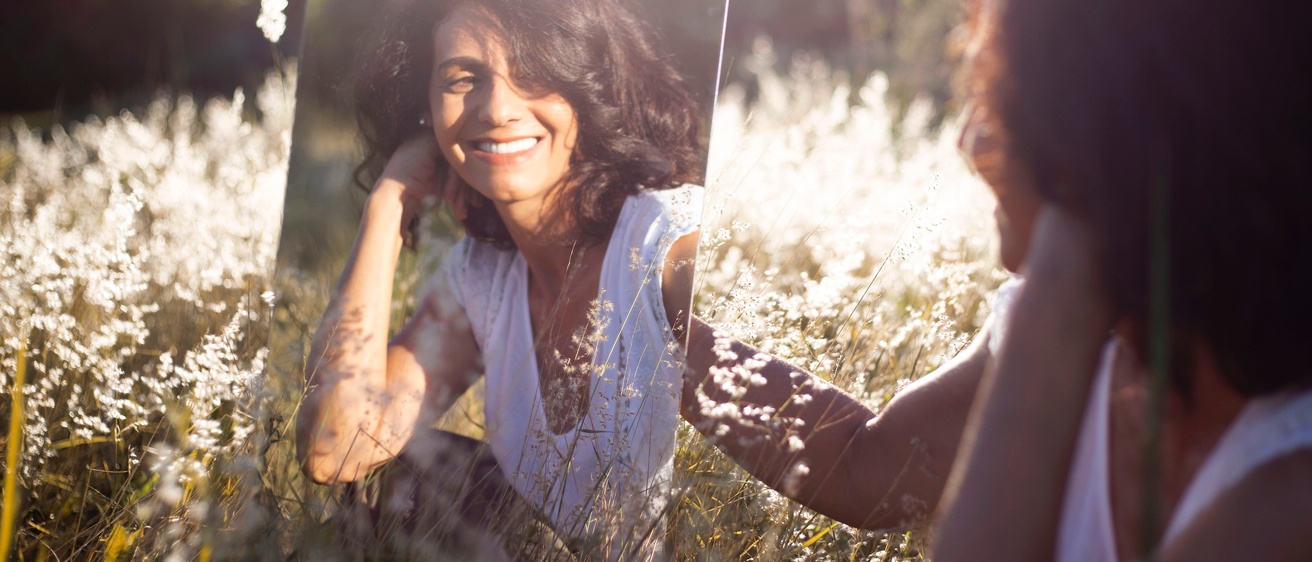Here we are again. Starting another academic semester, another new year, still living with the COVID-19 pandemic and systemic inequities. In these times of stress, trauma, and struggle, it is common to cope by avoiding unpleasant experiences. This avoidance might include distracting yourself with social media or binge-watching TV, numbing yourself with alcohol or drugs, or engrossing yourself in your work or school tasks.
But, what about self-reflection? What might happen if you allow yourself the cognitive and emotional space to reflect on your feelings and experiences?
The practice of self-reflection is our ability to “turn our attention inward to consider our own thoughts, memories, feelings, and actions.” (Philippi & Koenigs, 2014, p. 56) It is a productive evaluation of what is working in your life and what is not, what emotions you are experiencing, and what physical sensations you have in response to memories, thoughts, and emotions. Self-reflective practice uses an “observer stance,” through the use of curiosity and self-compassion, taking a non-judgmental perspective toward yourself.
Self-reflection has many benefits. It can improve emotional regulation skills (Leary, 2003) and emotional intelligence, which can increase your effectiveness in coping with life’s challenges. Self-reflection can deepen insight, which can help you make intentional changes in your life and thereby facilitate healing and support psychological health.
My Self-Reflection Journey
I initially approached these unprecedented times with avoidance. At the start of the pandemic, my children were 7, 4, and 1. Schools and daycares closed, my work shifted to home, and my spouse and I started working opposite shifts to accommodate dual careers at home with young children. I found myself offering only parts of me to my roles of a mother, spouse, and psychologist.
I focused on one day at a time, never feeling like I could give my best to any of my responsibilities. I told myself, “one more week of this and things will get better;” then, “one more month of this and things will get better;” then, “one more semester and things will get better.” As I began to notice my fatigue, irritability, guilt, and loneliness (despite rarely having time to myself), I committed to integrating self-reflective practice into my day.
I started with using time at the end of my day—before bed—to reflect on how I was feeling and where my body was holding my worries. I gained more insight about the guilt I felt as a mother who constantly felt distracted; the loneliness I felt as an extrovert who was no longer socializing with friends, colleagues, or family; and the fatigue I felt from constantly worrying about the health and safety of my children, parents, and grandparents.
I gained self-compassion for all that I was holding, acknowledging that I was doing the best I could at that moment. I realized I was spending all day caring for others and I needed to care for myself, too.
Soon, my unpleasant experiences began to be more balanced with positive experiences and thoughts. I felt proud of my ability to manage unknowns, think creatively, and support others as a psychologist. I noticed the care and passion I used to co-parent three young children with my spouse. I observed the values I used to drive my decision-making, such as honesty and transparency.
As I enter 2022 and start another semester, my roles and responsibilities remain the same. But,
I am more emotionally grounded, my daily headaches are gone, and I am confident I’m living a life directed by my values. I feel empowered and capable to take on challenges while celebrating my accomplishments.
I encourage you to engage in self-reflection to foster your overall wellness and support yourself in navigating the COVID-19 pandemic and other collective stressors, such as systemic inequities. You can start with the following suggestions:
- Start small. If this is new for you and you can only commit five minutes of your day, then start there. You may decide to increase to 10 minutes or 30 minutes, or stay at five minutes. Simply creating time for reflection is the goal.
- Choose a method that works for you. Just as we are diverse people and have a variety of beliefs, experiences, and behaviors, your preferences for reflective practice will also vary. Some may prefer sitting on the floor with their legs crossed, others may need to sit in a chair with firm back support, and others might prefer walking or cycling. Consider what will work best for you, and even try out a few methods before settling on your preference(s).
- Observe with curiosity. Remain curious about your experiences and allow space for a mix of emotions—both unpleasant and pleasant.
- Be kind to yourself. When you catch yourself being judgmental or critical, use self-compassion and curiosity and give yourself the same kindness you would give a friend or loved one.
If you want support in starting your self-reflective practice, these resources can help:
- Mindfulness Matters, a weekly session (via Zoom or in person) that allows you time to purposefully pay attention, non-judgmentally, to the present moment.
- Koru Mindfulness, an evidence-based curriculum specifically designed for teaching mindfulness, meditation, and stress management to college students and other young adults.
